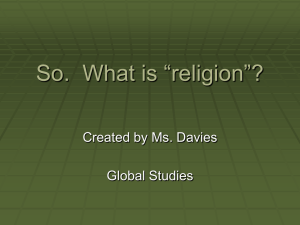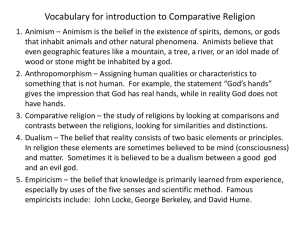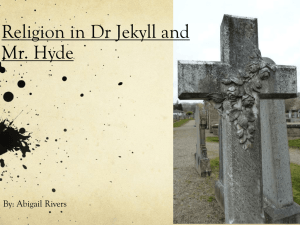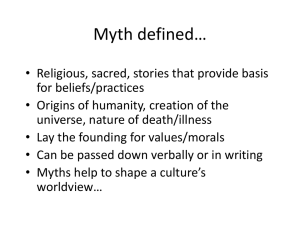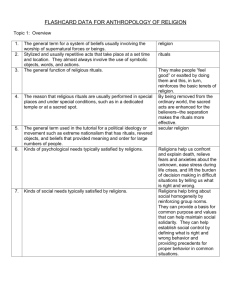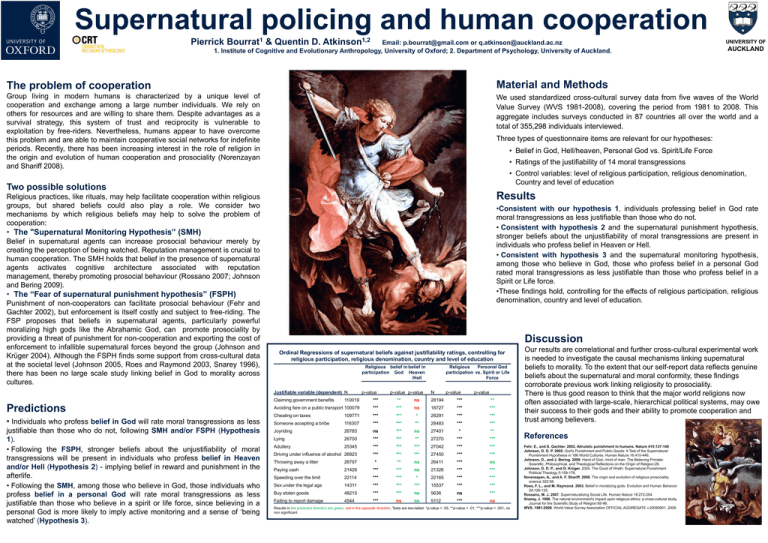
Supernatural policing and human cooperation
Pierrick Bourrat1 & Quentin D. Atkinson1,2
Email: p.bourrat@gmail.com or q.atkinson@auckland.ac.nz
1. Institute of Cognitive and Evolutionary Anthropology, University of Oxford; 2. Department of Psychology, University of Auckland.
UNIVERSITY OF
AUCKLAND
The problem of cooperation
Material and Methods
Group living in modern humans is characterized by a unique level of
cooperation and exchange among a large number individuals. We rely on
others for resources and are willing to share them. Despite advantages as a
survival strategy, this system of trust and reciprocity is vulnerable to
exploitation by free-riders. Nevertheless, humans appear to have overcome
this problem and are able to maintain cooperative social networks for indefinite
periods. Recently, there has been increasing interest in the role of religion in
the origin and evolution of human cooperation and prosociality (Norenzayan
and Shariff 2008).
We used standardized cross-cultural survey data from five waves of the World
Value Survey (WVS 1981-2008), covering the period from 1981 to 2008. This
aggregate includes surveys conducted in 87 countries all over the world and a
total of 355,298 individuals interviewed.
Three types of questionnaire items are relevant for our hypotheses:
• Belief in God, Hell/heaven, Personal God vs. Spirit/Life Force
• Ratings of the justifiability of 14 moral transgressions
• Control variables: level of religious participation, religious denomination,
Country and level of education
Two possible solutions
Results
Religious practices, like rituals, may help facilitate cooperation within religious
groups, but shared beliefs could also play a role. We consider two
mechanisms by which religious beliefs may help to solve the problem of
cooperation:
•Consistent with our hypothesis 1, individuals professing belief in God rate
moral transgressions as less justifiable than those who do not.
• Consistent with hypothesis 2 and the supernatural punishment hypothesis,
stronger beliefs about the unjustifiability of moral transgressions are present in
individuals who profess belief in Heaven or Hell.
• Consistent with hypothesis 3 and the supernatural monitoring hypothesis,
among those who believe in God, those who profess belief in a personal God
rated moral transgressions as less justifiable than those who profess belief in a
Spirit or Life force.
•These findings hold, controlling for the effects of religious participation, religious
denomination, country and level of education.
• The "Supernatural Monitoring Hypothesis” (SMH)
Belief in supernatural agents can increase prosocial behaviour merely by
creating the perception of being watched. Reputation management is crucial to
human cooperation. The SMH holds that belief in the presence of supernatural
agents activates cognitive architecture associated with reputation
management, thereby promoting prosocial behaviour (Rossano 2007; Johnson
and Bering 2009).
• The “Fear of supernatural punishment hypothesis” (FSPH)
Punishment of non-cooperators can facilitate prosocial behaviour (Fehr and
Gachter 2002), but enforcement is itself costly and subject to free-riding. The
FSP proposes that beliefs in supernatural agents, particularly powerful
moralizing high gods like the Abrahamic God, can promote prosociality by
providing a threat of punishment for non-cooperation and exporting the cost of
enforcement to infallible supernatural forces beyond the group (Johnson and
Krüger 2004). Although the FSPH finds some support from cross-cultural data
at the societal level (Johnson 2005, Roes and Raymond 2003, Snarey 1996),
there has been no large scale study linking belief in God to morality across
cultures.
Discussion
Ordinal Regressions of supernatural beliefs against justifiability ratings, controlling for
religious participation, religious denomination, country and level of education
Religious belief in belief in
participation God Heaven
/Hell
Justifiable variable (dependent) N
Claiming government benefits
Predictions
• Individuals who profess belief in God will rate moral transgressions as less
justifiable than those who do not, following SMH and/or FSPH (Hypothesis
1).
• Following the FSPH, stronger beliefs about the unjustifiability of moral
transgressions will be present in individuals who profess belief in Heaven
and/or Hell (Hypothesis 2) - implying belief in reward and punishment in the
afterlife.
• Following the SMH, among those who believe in God, those individuals who
profess belief in a personal God will rate moral transgressions as less
justifiable than those who believe in a spirit or life force, since believing in a
personal God is more likely to imply active monitoring and a sense of ‘being
watched’ (Hypothesis 3).
p-value
p-value p-value
Religious
Personal God
participation vs. Spirit or Life
Force
N
p-value
p-value
110019
***
**
ns
28194
***
**
Avoiding fare on a public transport 100079
***
***
ns
18727
***
***
Cheating on taxes
109771
***
***
*
28291
***
***
Someone accepting a bribe
116307
***
***
**
28483
***
***
Joyriding
26785
ns
***
ns
27401
*
**
Lying
26700
***
***
**
27270
***
***
Adutlery
25345
***
***
***
27042
***
***
Driving under influence of alcohol 26823
***
***
***
27450
***
***
Throwing away a litter
26797
*
**
ns
26411
***
ns
Paying cash
21426
***
***
ns
21326
***
***
Speeding over the limit
22114
***
***
*
22165
***
***
Sex under the legal age
14311
***
***
***
15537
***
***
Buy stolen goods
48215
***
***
ns
5636
ns
***
Failing to report damage
4544
***
ns
ns
5112
***
ns
Results in the predicted direction are green, red in the opposite direction. Tests are two-tailed. *p-value < .05, **p-value < .01, ***p-value < .001, ns
non significant
Our results are correlational and further cross-cultural experimental work
is needed to investigate the causal mechanisms linking supernatural
beliefs to morality. To the extent that our self-report data reflects genuine
beliefs about the supernatural and moral conformity, these findings
corroborate previous work linking religiosity to prosociality.
There is thus good reason to think that the major world religions now
often associated with large-scale, hierarchical political systems, may owe
their success to their gods and their ability to promote cooperation and
trust among believers.
References
Fehr, E., and S. Gachter. 2002. Altruistic punishment in humans. Nature 415:137-140
Johnson, D. D. P. 2005. God's Punishment and Public Goods: A Test of the Supernatural
Punishment Hypothesis in 186 World Cultures. Human Nature 16:410-446.
Johnson, D., and J. Bering. 2009. Hand of God, mind of man. The Believing Primate:
Scientific, Philosophical, and Theological Reflections on the Origin of Religion:26.
Johnson, D. D. P., and O. Krüger. 2004. The Good of Wrath: Supernatural Punishment.
Political Theology 5:159-176.
Norenzayan, A., and A. F. Shariff. 2008. The origin and evolution of religious prosociality.
science 322:58.
Roes, F. L., and M. Raymond. 2003. Belief in moralizing gods. Evolution and Human Behavior
24:126-135.
Rossano, M. J. 2007. Supernaturalizing Social Life. Human Nature 18:272-294.
Snarey, J. 1996. The natural environment's impact upon religious ethics: a cross-cultural study.
Journal for the Scientific Study of Religion:85-96.
WVS. 1981-2008. World Value Survey Association OFFICIAL AGGREGATE v.20090901, 2009.



